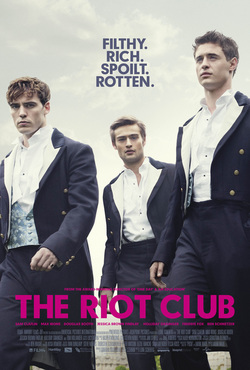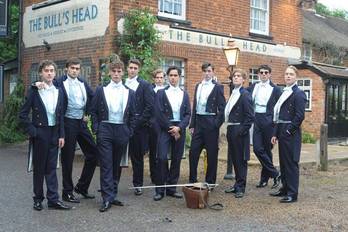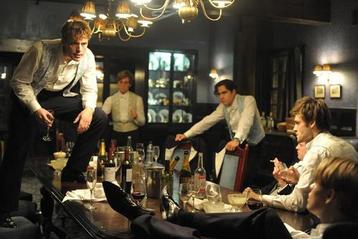
Posh. In some circles, it’s a word spat out in venom. When you think of the word “posh”, you immediately think of toffs with an abundance of riches, swilling port in lavish private clubs from their crystal glasses and smoking cigars made of unicorn hair. That may sound ridiculous but the connotations surrounding the upper-classes is sometimes so reviled that you wonder what they ever did to upset the masses. And then you remember the Tory Government and the man who is currently the Prime Minister. Not meaning to stereotype because I’m sure there is a lavish amount of people with millions who are genuinely altruistic and nice, but most people hate people who flash the cash without realising that in a lot of ways, it’s because we want it to. What we actually hate is privilege. Those who think their riches allows them to exert power of them, that they are better than you because they have a wad of cash in their pocket. It’s those people that are portrayed in The Riot Club.

The main draw here is Sam Claflin. He excels in a sea of plum voices all equally brilliant and deplorable as the next. Though his performance is perforated by that of Max Irons, Freddie Fox, Douglas Booth and the lovely Ben Schnetzer, Claflin is vilified and it’s a stunning loathed role. He captures the essence of Alistair and unravels it with ingenuity. Starting off coaxing slight empathy as he is backlashed against by his family, Iron’s Milo and is even mugged, Claflin dwindles his mad sense of entitlement in an enthralling way. Lyle’s viewpoint of his comforted world has turned into rage, one that he uses to undermine those he think are beneath him. Claflin’s talent is to not exude it with straight-on ferociousness but placates the anger so it boils under astute facial expressions and eye flickers. When that steam rises to straight-up bile from his mouth, you loathe him, which is a stellar turn from the likeable Claflin.

The acting is the main draw here and the collection of young adult thespians definitely have a long career ahead of them including Holliday Grainger who has a saner character to play. There are unbelievable moments and sure, the film reveals in them for entertainment sake. It could largely be down to the translation from stage to screen, carrying the dialogue and set up that needs to be amplified for theatres but has to be understated more for film. What The Riot Club fails to do deftly handle the issues and masterful craft them. Instead of encouraging your opinion, it slams it over your head.

 RSS Feed
RSS Feed
